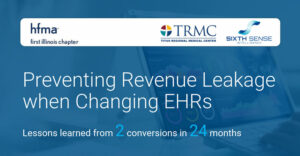The HFMA Region 8 Mid America Summer Institute, Aug 5-7, in Omaha, NE, hosted a dynamic CFO panel discussion moderated by HFMA President and CEO Anne Jordan. CFOs from diverse healthcare organizations shared their strategies and challenges in navigating the evolving healthcare landscape. This article highlights key takeaways from the panelists on revenue enhancement, Medicare Advantage and alternative payments, consumerism, transparency, cybersecurity, innovation, margin improvement, and strategic vision.

Revenue Enhancement Strategies
Mike Dewerff, CFO of Bryan Health, emphasized a robust payor strategy and the adoption of automation and AI to bridge the gap between staffing and revenue realization. Bryan Health has integrated tools like 3M coding, real-time authorization, and real-time eligibility checks to streamline processes. Dewerff highlighted the importance of training and building strong relationships with payors, despite occasional ethical concerns. His philosophy is simple: “Every dollar counts.” Bryan Health is committed to ensuring they receive every dollar they are owed.
Austin Willuweit, CFO of Monument Health, highlighted their team-based approach to revenue enhancement, which includes hiring dedicated resources to manage denials and adopting Epic’s best practices. They have made significant efforts to identify uncaptured charges, improving their financial strategy. Monument Health’s collaborative approach with engaging operational leaders, has been key to enhancing its revenue streams.
Jana Cook, CFO of Phelps Health, a county-owned independent hospital, has focused on revenue cycle optimization over the past three years. The organization leverages its existing systems, particularly Epic, with a strong emphasis on managing denials. Cook underlined the importance of education and understanding “the why” behind their actions, which has been crucial to their revenue enhancement efforts.
Sandra Christensen, CFO of MercyOne, addressed the unique challenges faced by Critical Access Hospitals (CAH), particularly the difficulty of enhancing revenue due to the multitude of payors involved. MercyOne is adopting a grassroots approach, working as a team, and introducing AI at the network level to improve payor compliance. These strategies help Critical Access Hospitals navigate the complex financial landscape.
Medicare Advantage and Alternative Payments
Medicare Advantage presents varying challenges across healthcare organizations. Mike Dewerff noted that Bryan Health has seen mixed results, finding it challenging to work with national plans, while finding regional plans more cooperative. Jana Cook from Phelps Health highlighted the significant effort required to manage denials under Medicare Advantage. Sandra Christensen added that Medicare Advantage dilutes cost-based reimbursement for Critical Access Hospitals, further complicating their financial sustainability.
In terms of alternative payments, Bryan Health has found success with by being involved in an Accountable Care Organization (ACO). Efforts include moving care to lower-cost locations and directly contracting with employers. Austin Willuweit of Monument Health discussed their involvement in a Clinically Integrated Network (CIN) and ACO focused on community health with an emphasis on downside risk. Jana Cook mentioned that Phelps Health recently joined an ACO and is learning how to implement this model effectively.
Consumerism and Transparency
Bryan Health has proactively educated patients through initiatives like the No Surprise Act and the MyChart app, which have enhanced transparency in healthcare costs in addition to fostering better patient understanding and engagement.
Monument Health is also committed to transparency, working closely with patients to provide clear explanations of care costs and offering lower-cost care alternatives. This patient-focused approach is central to their consumerism strategy.
At Phelps Health, financial navigators help patients understand out-of-pocket costs and enroll in government plans. Jana Cook highlighted that the state Medicaid pilot program to support rural healthcare infrastructure significantly benefits Phelps Health.
Cybersecurity and Innovation
Cybersecurity remains a top priority for all panelists. Mike Dewerff from Bryan Health discussed their extensive drills to prepare for potential breaches, emphasizing readiness, particularly in terms of cash on hand and operational continuity. Austin Willuweit of Monument Health echoed this sentiment, noting that they conduct full-scale and ransom drills to ensure preparedness. Jana Cook emphasized Phelps Health’s investment in cybersecurity staff and rigorous vendor due diligence. Sandra Christensen highlighted that MercyOne prepares for interruptions by maintaining strong cash balances, acknowledging that breaches are inevitable.
Innovation was another key focus area. Bryan Health collaborates with the University of Nebraska on projects like a mini surgical robot, ensuring all innovations pass through a value analysis team. Austin Willuweit discussed Monument Health’s formal innovation process, including annual operational planning sessions to build business cases. At Phelps Health, an innovation summit allows all areas of the organization to submit ideas and showcase achievements. Sandra Christensen noted that MercyOne’s introduced virtual nursing, which supports floor nurses and enhances patient engagement.
Margin Improvement and Strategic Vision
Margin improvement strategies varied across the organizations. Bryan Health, led by Mike Dewerff, is focused on risk analysis, particularly workforce shortages, and is working to reduce reliance on contract nursing/traveling nurses without cutting services. Austin Willuweit emphasized Monument Health’s systemwide benchmarking to manage overhead costs, urging corporate departments to lead by example. Jana Cook discussed Phelps Health’s three-year process to manage expenses, addressing areas like supplies, contracts, and employee benefits. Sandra Christensen added that MercyOne coordinates service locations within their rural network to ensure efficient use of staffed beds.
In terms of strategic vision, Bryan Health emphasizes collaboration with physicians as investors. Monument Health recognizes the need to partner with outside specialists and remains cautious with private equity. Sandra Christensen of MercyOne stressed the importance of proactive partnerships, with a focus on succession planning and strategic leadership development.
Closing Advice from CFOs
The panelists offered invaluable advice for healthcare CFOs throughout the Midwest. Mike Dewerff emphasized the importance of participation in HFMA and networking, noting that who you know can be as important as what you know. Austin Willuweit suggested that CFOs should also be operational leaders, even taking weekend on-call shifts to stay connected with the organization. Jana Cook encouraged aspiring leaders to seek additional responsibilities and find a mentor to help them grow. Sandra Christensen advised being intentional in leading projects and groups, focusing on succession planning, and developing both technical and strategic leadership skills.
As healthcare organizations strive to improve profitability, Sixth Sense Intelligence’s mission is to help you use data to discover opportunities to significantly reduce costs and increase revenue.
Contact us to learn more!





